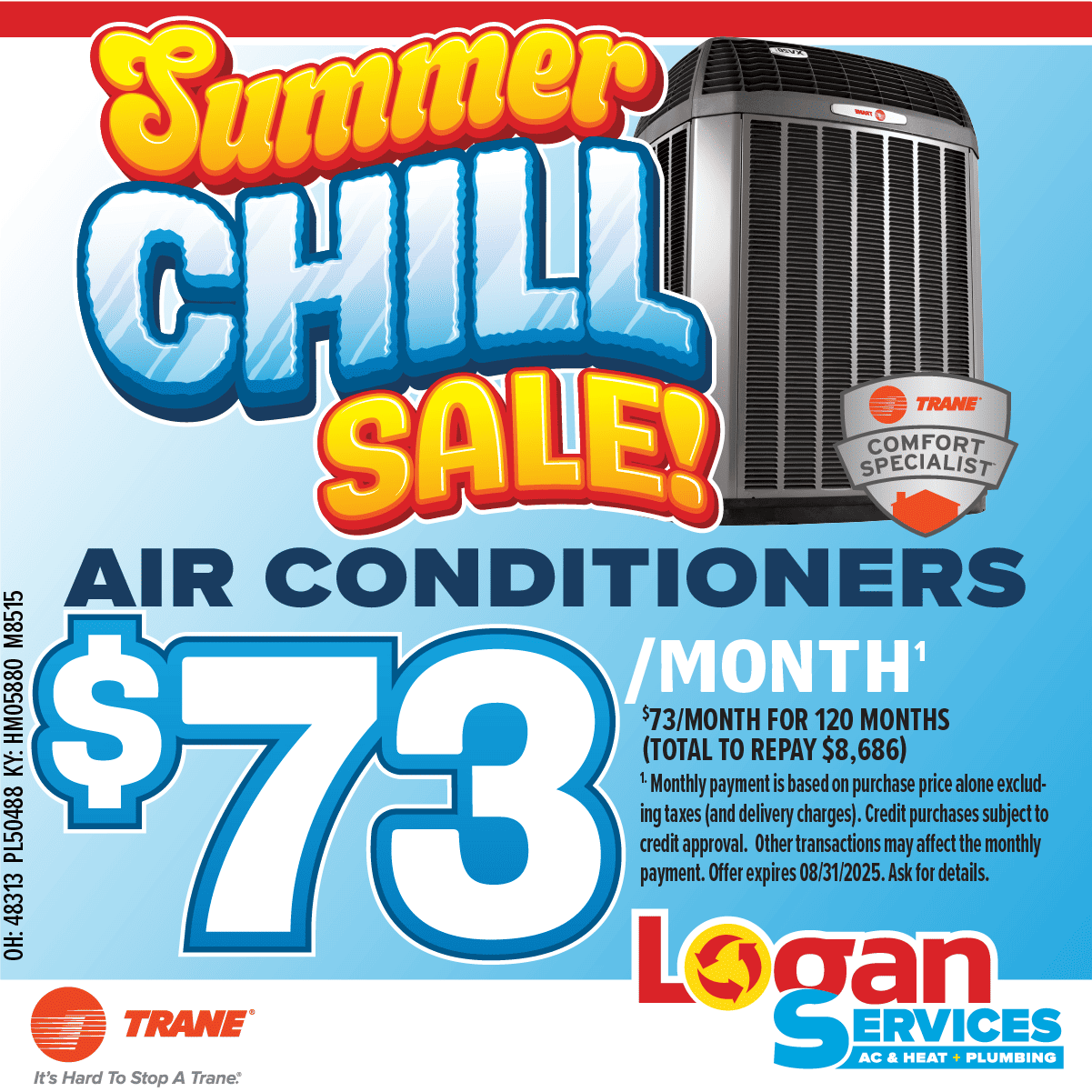Summer is meant for soaking up the sun and staying cool, not dealing with a frozen air conditioner. Nothing can ruin a hot summer day faster than realizing your air conditioner has frozen over and stopped working on the hottest day of the year. While less common than winter freezes, heat pump and AC unit freezes can happen in summer, too. Fortunately, there are steps you can take to help prevent your outside compressor from icing up and malfunctioning during the warm weather months. Keep reading if you want to know what to do if your heat pump froze up in summer.
Why Heat Pumps Freeze Up in Summer
Heat pumps and AC units freeze for a simple reason – the warm refrigerant flowing through the unit’s coils gets too cold. This causes moisture in the air passing over the coils to condense and freeze. But why does this refrigerant get so cold in the first place? There are a few common culprits:
- Low Refrigerant Levels: The refrigerant in a heat pump unit is responsible for absorbing heat from inside your home and releasing it outside. But if refrigerant levels are too low, the remaining refrigerant expands too much and loses its warming abilities. This chilled refrigerant then freezes moisture on the coils.
- Poor Airflow: Proper airflow across the coils is critical to avoid freezing in summer. When airflow is obstructed by debris or the fan isn’t spinning fast enough, refrigerant can’t dissipate its heat. The coils absorb all that cold and begin to freeze over.
- Dirty Coils: As coils become clogged with dirt, dust, and debris, it impedes airflow. With less air to warm the refrigerant, the coils take on that cold and start to freeze over time.
By identifying and resolving these common issues, you can greatly reduce the risk of your heat pump freezing up in summer.
How to Prevent Summer Heat Pump Freezes
Many summer AC freezes can be avoided by performing regular maintenance and following good operating practices. Here are pro tips for keeping your heat pump running smoothly all season long:
Clear Debris and Improve Airflow
Make sure the area around your outside AC compressor is clear of debris, plants, and other obstructions. Anything that blocks airflow across the coils can cause freezing issues. Regularly trim back bushes or branches that may have grown around the unit. Inspect the outdoor fan to confirm it spins freely and ramps up to the proper speed. Use a fan blade cleaning spray if needed to remove built-up dirt. Call a technician if the fan seems slow or strained.
Clean Outdoor Coils
Dirty coils block airflow and lead to reduced efficiency and freezing in heat pumps. Carefully clean debris from the coils using a soft brush attachment and hose. Be gentle as the coils can bend or puncture easily.
Consider having an HVAC technician deep clean the coils annually or biannually. They can safely apply a coil cleaning solution and rinse thoroughly without damaging the fins. Proper coil cleaning improves airflow and significantly reduces freeze risk.
Check Refrigerant Levels
Have an HVAC professional assess the refrigerant charge at the beginning of each cooling season. Adding refrigerant, if low, can prevent inadequate cooling and expansion that leads to freezing issues.
Signs you may be low on refrigerant include reduced cooling capability, short cycling on and off, and coils or lines that feel warmer than usual. Catching low refrigerant early prevents bigger issues down the road.
Ensure Proper Drainage
The drain line carries away condensed water from the heat pump’s evaporator coils. Make sure it remains clear of slime, algae, and debris buildup by pouring a 50/50 bleach and water solution down the line every month. Clogs prevent water drainage and lead to ice formation. Also, check that the outdoor unit remains completely level. Any tilt can prevent proper drainage and cause water pooling around coils. Use a level to check and make any necessary adjustments.
Run a Dehumidifier
Excess humidity makes it harder for an AC system to effectively remove moisture from indoor air. This can lead to freezing issues as the unit struggles to condense all the water vapor. Extended run times strain the refrigerant coils with excess moisture. Run a high-capacity dehumidifier on humid days to remove excess moisture from the home. Keeping indoor humidity at an acceptable level eases the burden on your AC.
Adjust Thermostat Settings
Don’t crank your thermostat down too low on hot days or drastically change temperatures. Overcooling strains the AC unit as it struggles to reach the extreme temperature. Starting with a moderate setting around 75°F provides efficient cooling without risk of freezing up the coils. Also, avoid cycling the unit on and off repeatedly. Quick cycling prevents even refrigerant distribution. Maintain a regular, comfortable temperature.
Perform Preventative Maintenance
Have an HVAC technician do a full pre-summer maintenance checkup each year. They will ensure refrigerant levels are optimal, check for leaks, test fan speeds, amps, and pressures, plus clean coils and the condensate drain. Proper maintenance prevents many freezing issues.
What if My Heat Pump Freezes?
Even if you follow all the recommended tips, a frozen heat pump can still happen. Here is what you should do:
- Turn the thermostat to “Off” to stop the cooling cycle.
- Check for ice buildup on the coils. Use a hair dryer on a fan setting (no heat) to melt the ice if present.
- Once coils are ice-free, restart the unit and feel for cooler air exiting. If warm, call for service.
- If freezing happens repeatedly, have a technician inspect for leaks, blockages, and low refrigerant.
- Do not attempt to chip away at ice yourself. This can easily damage fins and coils.
Prolonged freezing can seriously damage the compressor. Call in an HVAC professional for diagnosis and repair if you cannot resolve repeated freezing.
In summary, there are several key steps you can take to help prevent frustrating summer heat pump freezes. First, keep the outdoor unit clear of any debris or foliage that could block airflow across the coils and compressor. Frequently cleaning the condenser coils of dirt buildup will also improve airflow and efficiency. Have an HVAC technician check refrigerant levels before cooling season starts and top off if low to prevent inadequate cooling issues. Additionally, inspect the drain line to ensure no obstructions are present so condensate can drain freely. Running a dehumidifier on humid days will ease the workload on your AC system. When setting your thermostat, aim for a moderate temperature between 75-80°F to avoid overworking the unit. Lastly, have a professional perform comprehensive maintenance and a tune-up prior to summer to ensure your heat pump is ready for cooling season. Following these tips diligently can go a long way in preventing summer freeze ups and keep your system running smoothly all season. Be sure to schedule repairs promptly if any issues do arise to get your cooling back online before the hot weather sets in. With proper maintenance and care, you can enjoy cool comfort all summer without worries of losing your AC due to freezing coils.
Frequently Asked Questions
What temperature setting prevents freezing?
Set your thermostat between 75-80°F in summer. Avoid drastic temperature swings or overcooling below 70°F. This prevents strain on the AC system.
How often should I have an HVAC technician do maintenance?
Schedule annual pre-season checkups. Also call anytime you notice odd performance or freezing issues arise for diagnosis.
Why does my AC freeze but not the heating in winter?
Winter freezing occurs on the outdoor coils by cold external temperatures. Summer freezes happen because of internal issues like low refrigerant, airflow blockages or dirty coils.
Is a frozen AC always broken?
Not necessarily. One-off freezes can happen if the AC runs constantly on very hot, humid days. But recurrent freezing indicates an issue needing repair.
Can I insulate the AC lines to avoid freezing?
Outdoor refrigerant lines are designed to dissipate heat into the outside air. Adding insulation interferes with this and is not recommended or safe.




















